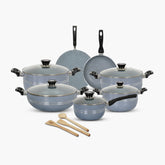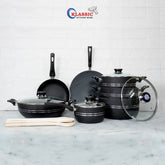Electric vs Stovetop Pressure Cookers: What Actually Works in Pakistani Kitchens?
If you’ve ever tried making nihari on a Sunday morning while juggling the roti, you know a pressure cooker can be your best friend — or a noisy headache. With so many households in Pakistan relying on pressure cookers to whip up everything from daal to paye, one question keeps coming up:
Should you go electric, or stick with the old-school stovetop?
Here’s a no-nonsense comparison, based on how we actually cook at home.
🔥 Stovetop Pressure Cookers: The Desi Kitchen Workhorse
This is what most of us grew up with. Whether it’s your ammi's classic aluminum pot or a newer model from brands like Klassic Kitchenware, stovetop cookers have a solid reputation.
Why folks still love them:
-
Fast cooking — meat dishes like nihari or haleem cook much quicker.
-
No electricity needed — works during loadshedding (which, let’s be honest, still happens).
-
Control over heat — you can crank it up or simmer as needed.
-
Affordable — great for large families or anyone on a tight budget.
But here’s the downside:
-
You have to keep an eye on it — no multitasking.
-
Some models are loud — the whistle can be startling if you're not used to it.
-
Beginners struggle with timing and steam release at first.
⚡ Electric Pressure Cookers: Convenient, But Not Always Practical Here
Electric cookers — like the popular Instant Pot — are sleek and come with digital controls. Great for people who like smart appliances. But are they ready for the average Pakistani kitchen?
What’s nice about them:
-
Push-button cooking — great for working moms or students.
-
Most have built-in safety features, so there’s less risk of accidents.
-
Can do more than just pressure cook — think slow cook, sauté, even yogurt!
Where they fall short:
-
Need constant electricity — a big problem during load shedding.
-
Usually cost more than traditional cookers.
-
They take longer to reach full pressure — not ideal for a quick karahi or daal.
🏠 What Fits Better in a Pakistani Kitchen?
Here’s how most people decide:
-
Live in a joint family? Go with a stovetop cooker. It’s faster, durable, and fits larger portions.
-
Living alone or always in a rush? An electric pressure cooker might suit your lifestyle, especially if you’re cooking in small batches.
-
If you don’t want to rely on UPS or inverters, skip the electric.
At Klassic Kitchenware, stovetop pressure cookers are still the top choice for everyday Pakistani meals. You’ll find everything from compact 3-liter cookers to massive 11-liter ones, all made with quality materials and safety features.
🤔 FAQs — What People Ask Before Buying
Is an electric cooker safe to use in Pakistan?
Yes — but only if you’ve got stable electricity. No one wants their biryani half-cooked during a power outage.
Can I cook meat in an electric cooker?
Of course! But expect a few extra minutes — it builds pressure more slowly than stovetop ones.
Do electric cookers use less gas?
They use no gas at all. But they do depend on electricity, which comes with its own cost.
Is one better than the other?
Not really — it depends on what you cook, how often, and whether you prefer automation or control. Need help choosing the right size, model, or series? Don’t miss our Pressure Cooker Buying Guide for Pakistani Kitchens — packed with expert tips, comparison charts, and the best deals from Klassic Kitchenware.
Final Word: What’s Right for You?
Look — if you're someone who makes daal chawal twice a week, needs food ready fast, and doesn’t want surprises during load shedding, a classic stovetop cooker is still your best bet.
But if you're tech-savvy, have a stable power supply, and want to dump ingredients and walk away — give the electric option a shot.
Whatever you choose, make sure it suits your lifestyle, not just the trend. Need a reliable pressure cooker built for Pakistani kitchens? Check out Klassic Kitchenware’s stovetop collection — trusted by home cooks across the country.







